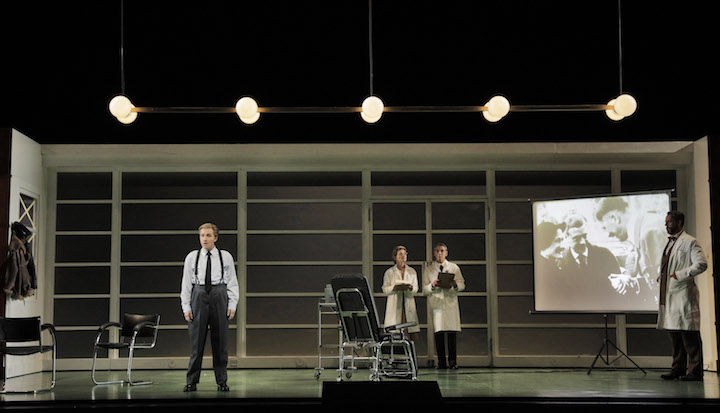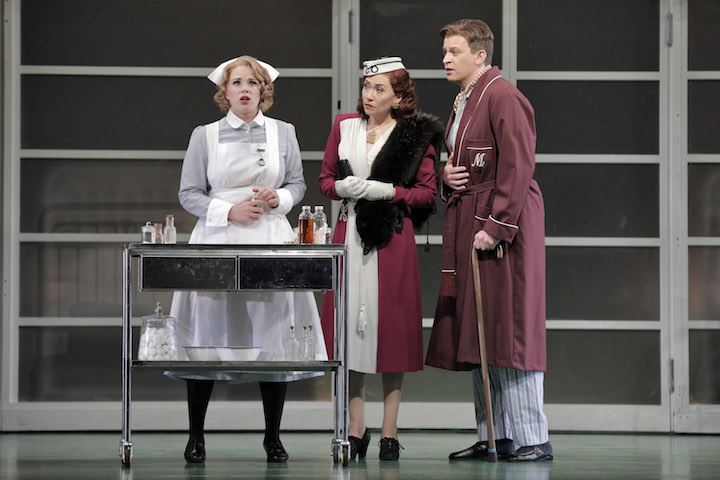Orlando, Handel’s Italian opera for English audiences, is based on an epic poem by the 16th-century poet Ludovico Ariosto. Orlando Furioso, loosely translated as the Madness of Roland, is set in the midst of the Crusades, and its hero is driven mad by his love for a pagan princess.
The setting of San Francisco Opera’s production of Orlando is also in the midst of war, but the pastoral setting of the poem, which included a shepherdess, has definitely gone urban. British director Harry Fehr has placed the opera within the audience’s memory, specifically, the time of the London Blitz. And his Orlando has been confined to a hospital where he struggles with the demons of war, manhood and betrayed love. His pagan princess Angelica is an American, who has fallen in love with another war-damaged fighter, Medoro, and is planning to run away with him, back to the colony of barbarians on the other side of the pond.

Handel’s magician Zoroastro has morphed into a medical doctor bent on returning the heroic Orlando to the battlefield, ultimately through electro-shock treatment. All of which isn’t much more of a stretch than the original where Zoroastro employs spiritualism, of a sort, to cure the mad Orlando. Bass-baritone Christian Van Horn fills the role with a resonant and deep chested authority, as he sings an appeal to Orlando’s male identity, asserting that “glorious deeds will be remembered forever.” Meanwhile … your fiancée’s affections are as ephemeral as a spring day.
The charming role of the shepherdess is now an equally charming nurse, Dorinda, making beds, distributing cups of tea, and falling futilely in love. Soprano Christina Gansch fulfills the role with sparkling tones and a dash of wide-eyed humor that lightens the terror and angst of the characters and the implacability of fate.
The vocal weight of the opera falls on the shoulders of mezzo-soprano Sasha Cooke as Orlando, a role written originally for the primo uomo of the time, the castrato Senesino. Dauntingly low, Orlando’s arias are decorated with runs that seemed to sit at the very bottom of Cooke’s range. She negotiated them ably and beautifully, but at that depth in the female voice it’s hard to summon real power or, consequently, knock-your-socks-off drama. But there is some question in my mind about whether that’s even desirable in Handel whose music favors the decorous, lofty and beautiful. This is not Verdi. Taken on his own terms, Handel is unsurpassable.
One fascinating moment in the opera is Orlando’s second-act meltdown mad scene. Haunted by war and the infidelity of Angelica, Orlando slips into a series of recitatives and ariosos, as he vocally wanders through the love-torn chambers of his war-ravaged mind. The segment is unusual not only for its form, which leaves the da capo aria behind to leap a couple of centuries forward, but also for its psychological slant filled with Stygian metaphors.
The moment is isolated on stage by placing it in Orlando’s room, a separate and moveable stage feature, and darkening the rest of the stage. Fehr uses a similar technique for Dorinda’s aria “Quando spieghi tuoi tormenti”, placing the singer framed in a window of the brick hospital as she sings to a nightingale of her pain in losing Medoro’s love. Strangely, the pastoral moments of the opera work in the hospital setting, conjuring up the green lawns of England familiar in portrayals of wartime infirmaries and their wheelchair-bound officers. The severe but lovely production design was by Yannis Thavoris.
Only the video projections seemed to fall short of their potential in this production by lapsing into the bland and the pretty. None of them reflecting the horror that was Orlando’s mind. They could have equally been used for a comedy by Jane Austen.

Heidi Stober in the role of the faithless Angelica and Aryeh Nussbaum Cohen in the countertenor role of Medoro were entirely comfortable in their vocal roles. Nussbaum Cohen delivering a splendid third-act aria. And both in the wonderful first-act trio with Gansch, as all three lament and seek consolation for the iniquities of love.
The 40-piece symphony under the direction of British conductor Christopher Moulos making his San Francisco Opera debut negotiated Handel’s masterpiece with aplomb.
Altogether it was an alluring and provocative presentation of a great opera.
– Jaime Robles
Orlando continues at SF Opera through June 27. For tickets and information, visit sfopera.com
